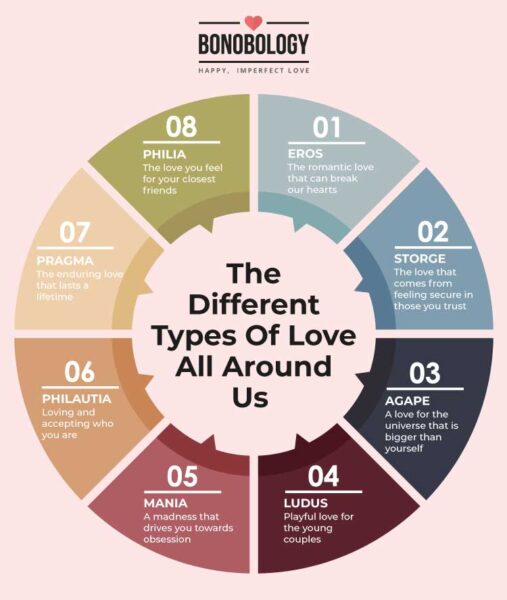
LOVE : 8 Types Of Love + How To Know Which One You’re Feeling
Love encompasses a range of strong and positive emotional and mental states, from the most sublime virtue or good habit, the deepest interpersonal affection, to the simplest pleasure. An example of this range of meanings is that the love of a mother differs from the love of a spouse, which differs from the love for food. Most commonly, love refers to a feeling of a strong attraction and emotional attachment
Love is considered to be both positive and negative, with its virtue representing human kindness, compassion, and affection, as “the unselfish loyal and benevolent concern for the good of another” and its vice representing human moral flaw, akin to vanity, selfishness, amour-propre, and egotism, as potentially leading people into a type of mania, obsessiveness or codependency. It may also describe compassionate and affectionate actions towards other humans, one’s self, or animals.
In its various forms, love acts as a major facilitator of interpersonal relationships and, owing to its central psychological importance, is one of the most common themes in the creative arts. Love has been postulated to be a function that keeps human beings together against menaces and to facilitate the continuation of the species.

8 Types Of Love + How To Know Which One You’re Feeling
According to clinical psychologist Kristina Hallett, Ph.D., research has defined two major types of interpersonal love: passionate love (which is what we think of as romantic love, involving attraction and sexual desire) and attachment (also known as compassionate love, which can be between caregivers and children, between long-term romantic partners, and other deeply bonded relationships).
Nevertheless, she adds, “We can certainly love people in a multitude of ways, and often do. When we think about the different Greek words for love, it’s possible to see how these connect to the greater categories of passionate and compassionate love.”
The question of what it means to love someone has been the inspiration behind so many songs for a reason: It’s a very complicated emotion that we all experience differently. Take the five love languages, for example. Everyone has their own way of giving and receiving love, especially with different people.
Below are the nine types of love described in the Greek language and how to navigate each one:

1. Eros (passionate love)
Eros is all about romance, passion, and attraction. It describes the intoxicating and thrilling emotions that the initial stages of a relationship can induce. “Relationships often begin with passion, including infatuation and attraction,” marriage therapist Jason B. Whiting, Ph.D., LMFT, tells mbg. “As exciting as this is, it is mostly a fusion element, designed to draw people together.”
Hallett adds, “Sexual interest, lust, or passion don’t necessarily evolve into lasting compassionate love.”
A tip for eros:
Enjoy each other’s company and the attraction you feel for each other while it is fresh and new. Over time, this type of love will often transition into another type—or simply fade away.
2. Pragma (enduring love)
Pragma is sometimes translated to practical love, referencing the kind of love grounded in duty, commitment, and practicality. While this might apply well to the type of love that blossoms in an arranged marriage, this is also the love you see in long-standing relationships and life partnerships—like when you see an old couple that’s been together for decades and decades. These are couples who find a way to make it work over time.
Pragma requires a commitment to each other and might be thought of as a conscious choice or perhaps as the type of love that takes years to develop through bonding and shared experiences. Whiting notes: “The brain’s response to a cherished long-term partner looks like contentment, caring, and nurturing.”
Hallett adds that eros can develop into pragma, and, in fact, many romantic relationships involve both: “Strong romantic relationships involve a combination of passionate love and compassionate love, which promotes an enduring and positive relationship.”
A tip for pragma:
The initial rush of attraction when you first meet someone, according to Hallett, “frequently stabilizes over time, which may lead people to feel that their partner ‘doesn’t love’ them as much. To counter this, partners can work together to communicate honestly, to recognize the deeper feelings of connection and compassionate love.”
3. Ludus (playful love)
Ludus is very flirtatious and fun, without the strings that come with eros or pragma. It can be seen in the very early stages of relationships, when two people are flirting, courting each other, and crushing on each other. It often involves laughing, teasing, and feeling giddy around a person. It’s very childlike in that way, though it can certainly evolve.
A tip for ludus:
Remember that all your crushes don’t need to “get serious” or pan out into full-blown relationships. Sometimes there’s great joy and pleasure in just enjoying the flirtation and the will-we-or-won’t-we game.
4. Agape (universal love)
Agape is selfless love, like the kind you might associate with saintly figures like Mother Teresa or activists like Malala. Hallett describes this love as a compassionate love for everyone, also known as universal loving-kindness. It’s the love you feel for all living things without question, that you extend knowingly without expectations for anything in return. It’s a very pure and conscious love. It’s similar to what we sometimes refer to as unconditional love.
A tip for agape:
Feeling that agape flowing through your veins? Practice a loving-kindness meditation, and lean into work that allows you to give back and help others.
5. Philia (deep friendship)
Philia is the love that develops over a deep, long-lasting friendship. It’s platonic, but nevertheless, you feel very close to those you have philia toward and can confide in them, trust them, and respect them on a very personal level. And according to Hallett, these friendships can be just as impactful as romantic relationships. “People may be surprised by the depth of pain and loss related to a long-standing friendship,” she says. “Often the loss or ‘breakup’ of a friendship is as painful and challenging as the loss of a romantic relationship.”
A tip for philia:
Spend quality time with your closest friends, and get vulnerable in a way you might not usually, by letting them know how much they mean to you.
6. Philautia (self-love)
Philautia has actually been having a bit of a moment lately—and rightly so! This love is all about self-love and self-compassion. It may seem obvious, but the relationship we have with ourselves is very important, and yes, it needs to be nurtured. Philautia is important for our own confidence and self-esteem, and it will also influence how we interact with the world. More love of self equals more love to offer. You can’t pour from an empty cup, after all.
A tip for philautia:
Pamper yourself with your favorite self-care activities, create a self-love ritual—literally anything you can give to yourself that makes you feel good, do it! (Here are some tangible ways to practice self-love.)
7. Storge (familial love)
Storge is the love shared between family members (typically immediate family), and sometimes close family friends or friends from childhood. It differs from philia in the way that it’s reinforced by blood, early memories, and familiarity. There’s a reason people say “friends are the family you choose.” You don’t choose your family, and whether they actually like your family members or not, many people often do love them instinctually. Storge is compassionate, protective, and deeply rooted in memory.
A tip for storge:
Work to strengthen your relationship with family members and forgive any past grievances.
8. Mania (obsessive love)
While some might argue this isn’t really “love,” the Greeks did have a word for “obsessive” love, and that’s mania. This is what we would describe as a toxic relationship or codependent relationship, where there’s usually some imbalance of affection causing one person to become overly attached. It can be hard to come back from mania, but if you can, there will need to be a healthier balance of affection.
A tip for mania:
Notice any patterns of possessive or codependent behavior and ask yourself what’s causing these feelings of insecurity and clinging. Let your partner know you’re struggling with it and try to pinpoint what needs to change. (Here’s more on how to stop being codependent.)
How can I tell which type of love I have?
Knowing what type of love you’re experiencing usually involves some level of self-awareness about the nature of your feelings toward a person. Be honest with yourself: Is it romantic, selfless, friendly, or playful? Another way to tell which kind of love you’re experiencing is to consider how long you’ve known each other.
Importantly, you can absolutely feel a combination of different loves for different people. Some common combos are:
- Eros and pragma
- Ludus and eros
- Philia and agape
- Philautia and agape
- Mania and eros
The bottom line.
No matter who or how you’re loving, giving and receiving love is one of life’s greatest joys, and understanding what we’re feeling for the people in our lives can help us nurture our relationships to be the most fulfilling they can be.
Source : wikipedia.org/wiki/Love

you’re really a good webmaster. The web site loading speed is amazing. It seems that you are doing any unique trick. In addition, The contents are masterwork. you’ve done a fantastic job on this topic!
Have you ever considered about adding a little bit more than just your articles? I mean, what you say is important and all. But imagine if you added some great visuals or video clips to give your posts more, “pop”! Your content is excellent but with pics and video clips, this website could certainly be one of the most beneficial in its field. Wonderful blog!
super saver pharmacy
Virtually all of the things you mention happens to be supprisingly legitimate and that makes me wonder why I had not looked at this with this light previously. This particular piece really did turn the light on for me personally as far as this specific subject matter goes. Nevertheless there is one particular issue I am not necessarily too comfy with and while I try to reconcile that with the actual central idea of the position, let me see just what the rest of your visitors have to say.Very well done.
Top site ,.. amazaing post ! Just keep the work on !
💓💗💖💘💕💞💝❤️
Dones 💟💕💕💞
Be love to each other person. Love is precious even more than I can say.
နေ့စဉ်တာဝန်မပျက်ပါ
Morning 🌞
All is well;)
Thank u all.
Thank!
Love is smooth.
We must win 2022💪
Thank you for allowing me to write cmt. admin ads are back as soon as possible and I wish you all the best
ဧရာသမိုင်းအရိုင်းမခံ🚣🚣🚣🚣🚣🧑💻🧑💻🧑💻
We must win💪
doyouloveme?
နာမည်မြင်တာနဲ့ သတိပေးနေသလိုပဲ နာမည်ပေးထားတာတော်တယ်😁😍
2
ချစ်တတ်ကြပါစေ
အော် အချစ် အချစ် 🤔😍🥰
Done
6 & 7
No.6 & No.7❤️
😇
❤
Good
I like No.6.Firstly,i’m trying to self-love.I’m learning the take care of myself so that I can take care of my solmate in the future.
And I like No.7.It’s the most pure love in so many love.❤️
I like No.6.Firstly,I’ trying to self-love.I’m learning the take care of myself so that I can take care of my solmate in the future.
And I like No.7.It is the most pure love in so many love.
Everybody should love other person. I think love is so precious and deep.
Love
1,3 and 6 ,😁
😍😍😍
Love is Love ❤.
Passionate Love
အချစ်တော့မသိပေမဲ့ မုန့်တော့သိတယ်😁😂
I don’t belong with love😑😑😑
Very interesting
i am learning how about love 😍
Giving and receiving love is one of life’s greatest joys. 👍👍👍
ကိုယ် မသိသေးသော ဘာသာရပ်
😁😁
ဧရာသမိုင်း မရိုင်းစေရ
What an interesting analysis of love 💗
With your definition, I think my heart holds a combo of types 4,6 & 7 💗
7🍀
3 and 6 😁